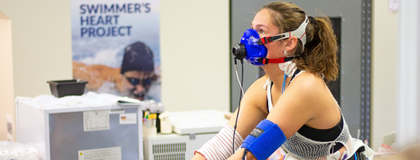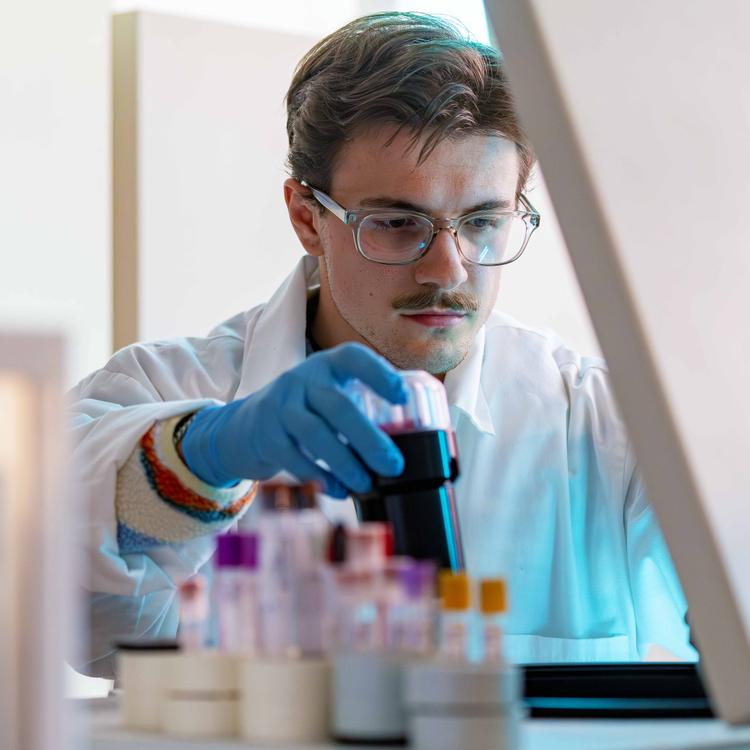
MSc Human Health and Nutritional Sciences
The Master of Science in Human Health and Nutritional Sciences focuses on physical activity and diet as powerful lifestyle determinants of human health. The interaction between genetics and environmental factors, including lifestyle, ultimately determines the health of an individual.
The MSc program offers advanced experiential learning opportunities in nutritional and nutraceutical sciences, general and exercise physiology, and biomechanics and neurophysiology, with a focus on lifestyle, genetics, and health.
The program is ideal for those interested in aging, diabetes, obesity, cardiovascular disease, nutrition and exercise, biomechanics, metabolism, and neuroscience. Graduates end up careers in academia, industry, or professional practice, including in health care.

Degree Details
The Master of Science (MSc) in Human Health and Nutritional Sciences offers two program types — thesis and coursework — designed to align with your research interests and professional goals.
Students in any of the MSc program options may choose one of the following specializations:
- Biomechanics and Neurophysiology
- Nutrition, Exercise, and Metabolism
- Nutrition and Nutraceutical Sciences
Admission is offered for the thesis and major research project options in Fall, Winter and Summer semesters. Admission for the coursework and team-based research project option is only offered for the Fall.
Program Options
Thesis
Pursue independent, original research under the supervision of a faculty advisor. Students complete a minimum of 1.5 graduate credits and defend an acceptable thesis that represents a significant contribution to their research field.
Applicants to the thesis program must secure a faculty advisor prior to submitting their application. Admission may be granted in Fall, Winter, or Summer semesters.
Coursework
Students in the coursework program complete 4.0 graduate credits through advanced coursework and research experiences. The coursework and major research project option requires a faculty advisor, but the coursework with team-based research project does not.
Students who apply with an identified faculty advisor, once admitted, work individually under the supervision of that advisor. Students complete a minimum of 4.0 graduate credits, which must include HHNS*6010 Fundamentals of Scientific Practice in Human Health and Nutritional Sciences.
Each research experience credit culminates in formal scientific deliverables, such as a written paper, an oral presentation, or a poster. A minimum of 1.50 research experience credits is required.
Applicants to this option must secure a faculty advisor prior to applying. Admission may be granted in Fall, Winter, or Summer semesters.
Engage in collaborative, project-based research within small interdisciplinary teams. Students work together to address real-world questions in human health, exercise, and nutrition while completing 4.0 graduate credits that integrate applied research, professional skills, and knowledge translation. This stream emphasizes teamwork, leadership, communication, and data-driven problem solving.
Applicants to the team option do not need to identify a faculty advisor prior to applying. Unlike the other MSc options, this stream does not include an individual research project. All research is completed collaboratively within small, faculty-mentored teams working on independent applied projects. Admission is granted only for the start of the Fall semester.

Collaborative Specializations
Master of Science in Human Health and Nutritional Science students may also add a collaborative specialization in Toxicology, Neuroscience, Regenerative Medicine or One Health. A collaborative specialization is an intra-university graduate field of study that provides an additional multidisciplinary experience for students enrolled in and completing the degree requirements for an HHNS graduate program.
- #1 in Total Research Dollars
- in Canada for a Comprehensive University (Maclean’s)
- Top 150 in the World
- for Life Sciences (Times Higher Education 2026)
- Top 20% in the World
- for Biological Sciences (QS Top Universities 2025)
- Top 5 in Canada for Life Sciences
- Top 4 for Life Sciences Teaching (THE 2026)

Research Strengths
The Department of Human Health Sciences has more than 25 faculty members specializing in a variety of research areas. These efforts are focused on understanding the basic underlying biological aspects of health, at the level of the individual, not community or populations. Research efforts are underway to better understand aging, neurological/sensory disorders, osteoarthritis, and chronic diseases such as cancer, cardiovascular disease, obesity, and type II diabetes, among many other topics.
Sample Courses
Please review the Graduate Academic Calendar for a complete list of courses and program requirements.
Building on an information base in nutrition, biochemistry and physiology, the course comprises selected research topics pertaining to the importance of nutrition as a determinant of health throughout the life span. Distinction will be drawn between the metabolic basis of nutrient essentiality and the health protectant effects of nutraceuticals.
A discussion of recent concepts in the relationships among nutrition, exercise and metabolism. Information from the molecular to the whole-body level will be presented with a focus on understanding nutrition and exercise in the human. Emphasis is placed on the development and testing of experimental hypotheses in these areas of research.
This course will provide students with a breadth of knowledge and understanding across the research frontiers pursued by the integrative biomechanics and neurophysiology group. Students will be given opportunity to practice and improve oral and written communication skills and provide constructive feedback to their peers. Additionally, this class will engage students in dialogue around topics pertinent to designing and conducting successful experiments such as hypothesis generation and ethical and practical considerations.
This course examines how the energy provision pathways in human skeletal muscle and associated organs meet the energy demands of the muscle cell during a variety of metabolically demanding situations.
This course explores the process of transforming health science research into practical applications, products, and solutions that address real-world challenges. This interdisciplinary course equips students with the skills to bridge the gap between discovery and implementation, combining principles of research, innovation, commercialization, and stakeholder engagement. Students learn how to navigate the pathways of science-driven innovation, including knowledge transfer, technology development, and entrepreneurial strategies, preparing them to drive impactful change in fields such as healthcare, sustainability, and technology.
Hear from MSc HHNS Graduates
Choosing an Advisor
Advisors are required for the thesis and coursework and individual-based major research project, but not for the team coursework option. Check out Before You Apply for helpful advice on identifying and reaching out to faculty members.
- Review current graduate student opportunities in the Department of Human Health Sciences
- Visit our ReSearch CBS database to search by research topic.
- Visit the Graduate Faculty page for a full list of faculty members who work with graduate students.
Meet Some of Our Faculty
To be considered, applicants must meet the requirements of a four-year honours science degree with a minimum 75% average during the final two years, or four semesters, of undergraduate study (learn how to calculate your admission average). Applicants should have completed a course in statistics.
Applicants for both the thesis or coursework and individual-based major research project must obtain the support of a faculty member willing to serve as their advisor prior to submitting an application. Those who apply without first finding an advisor will automatically be considered for the team coursework option.
Admission is offered for the thesis and major research project options in Fall, Winter and Summer semesters. Admission for the team coursework option is only offered for the Fall. Completed applications should be uploaded at least one full semester (four months) before the expected date of admission. Applications from international students should be uploaded six to nine months prior to the expected date of admission.
All components of the application, including transcript(s), graduate certificate(s), grading scale(s), English Language Proficiency tests, assessment forms, a statement of interest and the name of the faculty advisor must be uploaded no later than two months after an application is submitted through the OUAC portal. Applications that are incomplete after this time period will be closed.
Potential graduate students interested in the thesis or coursework and individual-based major research project should contact faculty members who share their research interests before completing and submitting an official application form. Applicants to the team coursework option do not need to identify a faculty advisor prior to applying.
To assist our faculty in making a selection from the pool of interested students, we suggest you include a statement, which contains the following:
- Courses completed (plus the mark received)
- Relevant research and/or work experience you have, and with whom
- Whether you have a scholarship
- Two to three academic or research references
- The reason for contacting that particular faculty member
You should be aware that students with insufficient command of the English language may not qualify for a Teaching Assistantship.
Graduate student applications to programs in the College of Biological Science are handled by the Office of the Associate Dean: Research (ADR). Before submitting an application, applicants are strongly encouraged to review the information found on the CBS website to learn more about the application process and how to fund your studies.
Complete application submission instructions may also be found on the Office of Graduate Studies webpage or in the Graduate Calendar.
Contact Us:
Dr. Stephen Brown, Graduate Program Coordinator
519-824-4120 ext. 53651
shmbrown@uoguelph.ca
Mira Jashari, Graduate Program Assistant
519-824-4120 ext. 56356
fjashari@uoguelph.ca
Karen White, Graduate Admissions Assistant
519-824-4120 ext. 52730
cbsgrad@uoguelph.ca

















